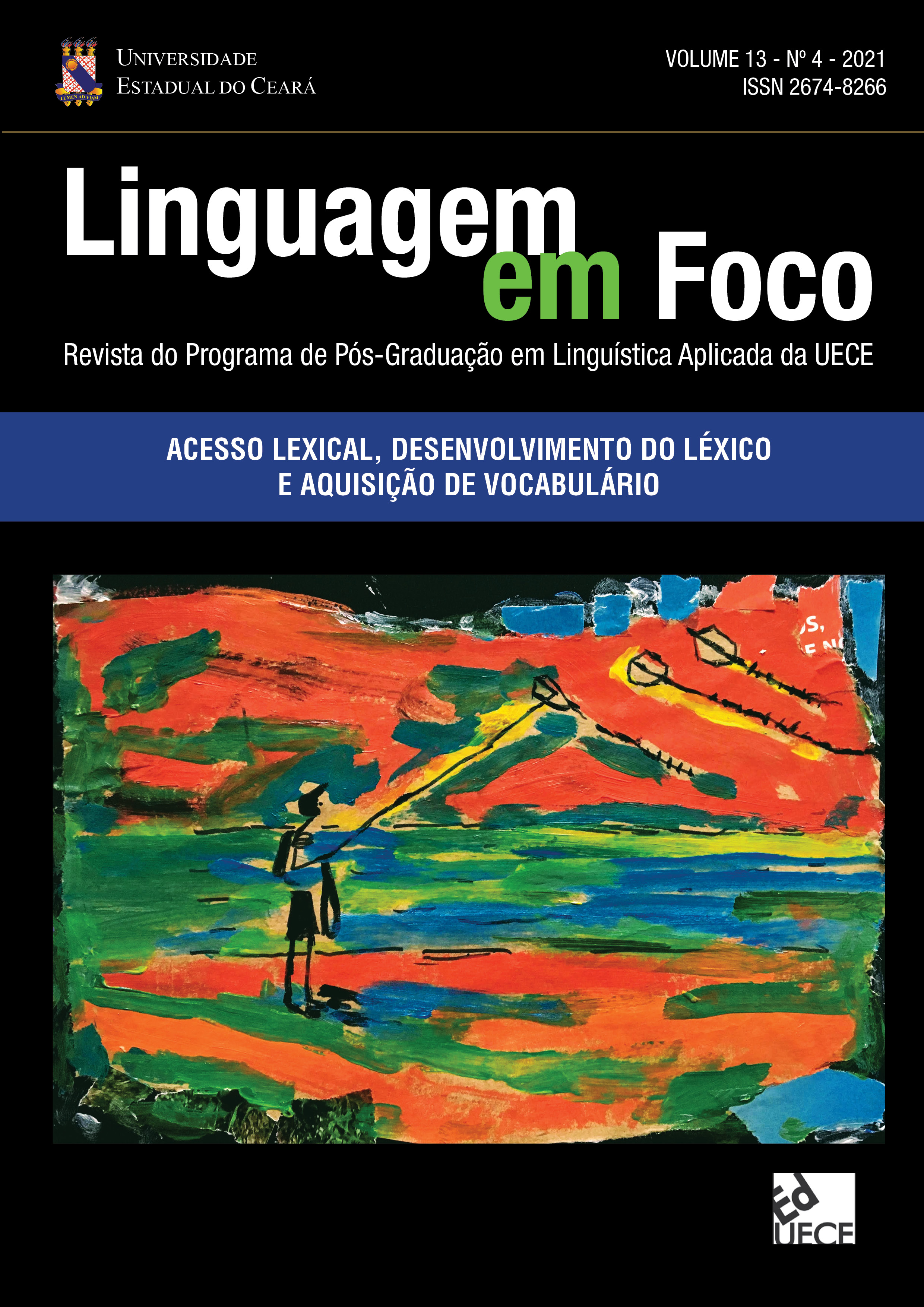Cognate and false cognate processing by Brazilian speakers of Portuguese, English and French
DOI:
https://doi.org/10.46230/2674-8266-13-7349Keywords:
Multilingualism, Lexical access, Cognates and interlingual homographsAbstract
Understanding how individuals who speak more than one language recognize and process words in different languages has been a central issue in multilingualism research. In recent decades, a great number of studies has gathered evidence demonstrating that the recognition of words in a language can be influenced by the knowledge of words in another language, that is, lexical access of multilingual individuals would be non-selective, meaning that both languages are active regardless of the target language. Thus, this study aimed at investigating the influence of the L1 and the L2 on the L3 in a group of 26 Portuguese (L1), English (L2) and French (L3) Brazilian trilinguals. Participants took part in two lexical decision tasks in French: the first composed of French words that were cognates with Portuguese, English or both, and the second included interlingual homographs in the same conditions. The results demonstrate the existence of an effect in the error percentages of both cognates and interlingual homographs, giving support to the non-selective lexical access hypothesis.
Downloads
References
BARBOSA PINTO, N.; ARÊAS DA LUZ FONTES, A.B. O acesso lexical em falantes multilíngues português-inglês-italiano. Veredas, v. 24 (1), 2020, p. 291-316.
CENOZ, J. The additive effect of bilingualism on third language acquisition : A review. The International Journal of Bilingualism, v. 7 (1), 2003, p.71-87.
COOK, V. Basing Teaching on the L2 User. Rascunho de capítulo. In: Llurda, 2003, Non-Native Teachers. Disponível em: http://homepage.ntlworld.com/vivian.c/Writings/Papers/BasingTeaching.htm. Acesso em 10 de fev. 2016.
DE BOT, Kees. The multilingual Lexicon: Modelling Selection and Control. The International Journal of Multilingualism, v. 1, n. 1, 2004.
DE GROOT, A. M. B.; DELMAAR, P.; LUPKER, S. J. The processing of interlexical homographs in translation recognition and lexical decision: support for non-selective access to bilingual memory. Quarterly Journal of Experimental Psychology, v. 53, p. 397-428, 2000.
DIJKSTRA, T; GRAINGER, J.; VAN HEUVEN, W. Recognition of cognates and interlingual homographs: The neglected role of phonology. Journal of Memory and Language, v. 41, v. 4, 1999, p. 496-518.
DIJKSTRA, T ; VAN JAARSVELD, H ; TEN BRIKE, S. Interligual homograph cognition: Effects of task demands and language intermixing. Bilingualism, Language and Cognition, v. 1, 1998, p.51-66.
DIJKSTRA, T.; VAN HEUVEN, W. J. B. The architecture of the bilingual word recognition system: from identification to decision. Bilingualism: Language and Cognition, v. 5, 2002, p. 175 – 197.
GIRARDET, J; PÉCHEUR, J. Écho A1: méthode de français. Paris: CLE International/Sejer, 2010.
GROSJEAN. Neurolinguistics, beware! The bilingual is not two monolinguals in one person. Brain and language. 1989, p.3-15.
HEREDIA, R.R.; CIEŚLICKA, A.B. Bilingual Lexical Ambiguity Resolution. 1. ed. Cambridge, 2020.
KEULEERS, E., & BRYSBAERT, M. (2010). Wuggy: A multilingual pseudoword generator. Behavior Research Methods 42(3), 627-633.
LEMHÖFER, K; DIJKSTRA, T; MICHEL, M. Three languages, one ECHO : Cognate effects in trilingual word recognition. Language and Cognitive Processes, 19(5), 2004, p.585-611.
PSYCHOLOGY SOFTWARE TOOLS, Inc. [E-Prime 2.0]. (2012). Retrieved from https://support.pstnet.com/.
SCHOLL, A; FINGER, I. Elaboração de um questionário de histórico da linguagem para pesquisas com bilíngues. Nonada: Letras em Revista, v.2, n. 21, 2013.
SPSS Inc. Released 2009. PASW Statistics for Windows, Version 18.0. Chicago: SPSS Inc.
SZUBKO-SITAREK, Weronika. Cognate facilitation effects in trilingual word recognition. Studies in second language learning and teaching. SSLLT 1 (2), 189-208.
VAN HELL, Janet G.; DIJKSTRA, Ton. Foreign language knowledge can influence native language performance in exclusively native contexts. Psychonomic Bulletin & Review. 9(4), 2002, 780-789.
VAN ORDEN, G. C. A ROWS is a ROSE: Spelling, sound and reading. Memory and Cognition. 1987. v. 15, p. 181-198. Reprinted by permission by the Psychonomic Society, Inc. Websites Cognate Linguistics. Disponível em: http://www.cognates.org/research/mfcogn2.html. Acesso em março de 2015.
Published
How to Cite
Issue
Section
License
Copyright (c) 2022 Laura Barcelos, Ana Beatriz Arêas da Luz Fontes

This work is licensed under a Creative Commons Attribution 4.0 International License.
Authors who publish in Linguagem em Foco Scientific Journal agree to the following terms:
- Authors retain the copyright and grant the journal the right of first publication. The articles are simultaneously licensed under the Creative Commons Attribution License which allows sharing the work with an acknowledgement of its authorship and initial publication in this journal.
- The concepts issued in signed articles are the absolute and exclusive responsibility of their authors. Therefore, we request a Statement of Copyright, which must be submitted with the manuscript as a Supplementary Document.
- Authors are authorized to make the version of the text published in Linguagem em Foco Scientific Journal available in institutional repositories or other academic work distribution platforms (ex. ResearchGate, Academia.edu).





























